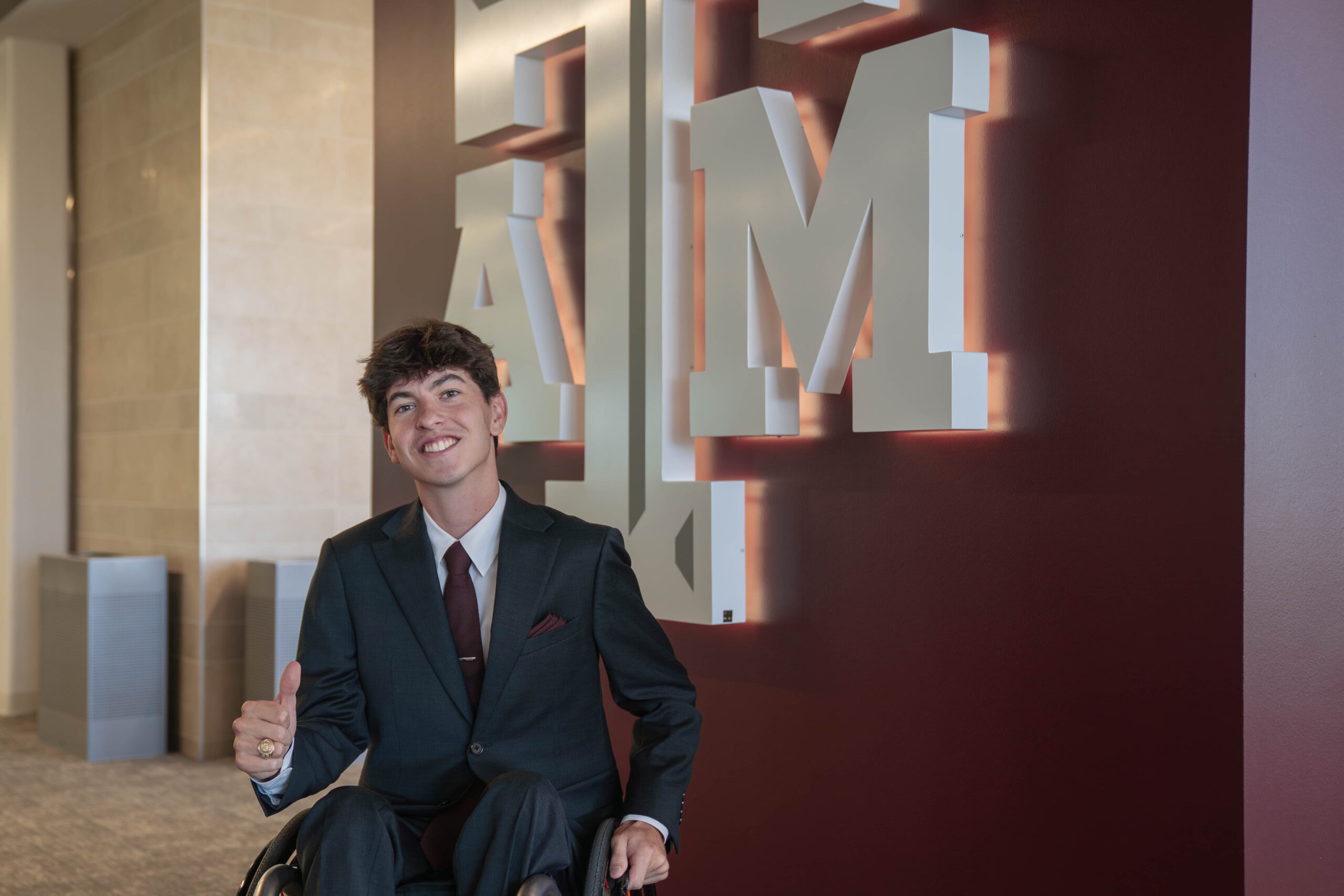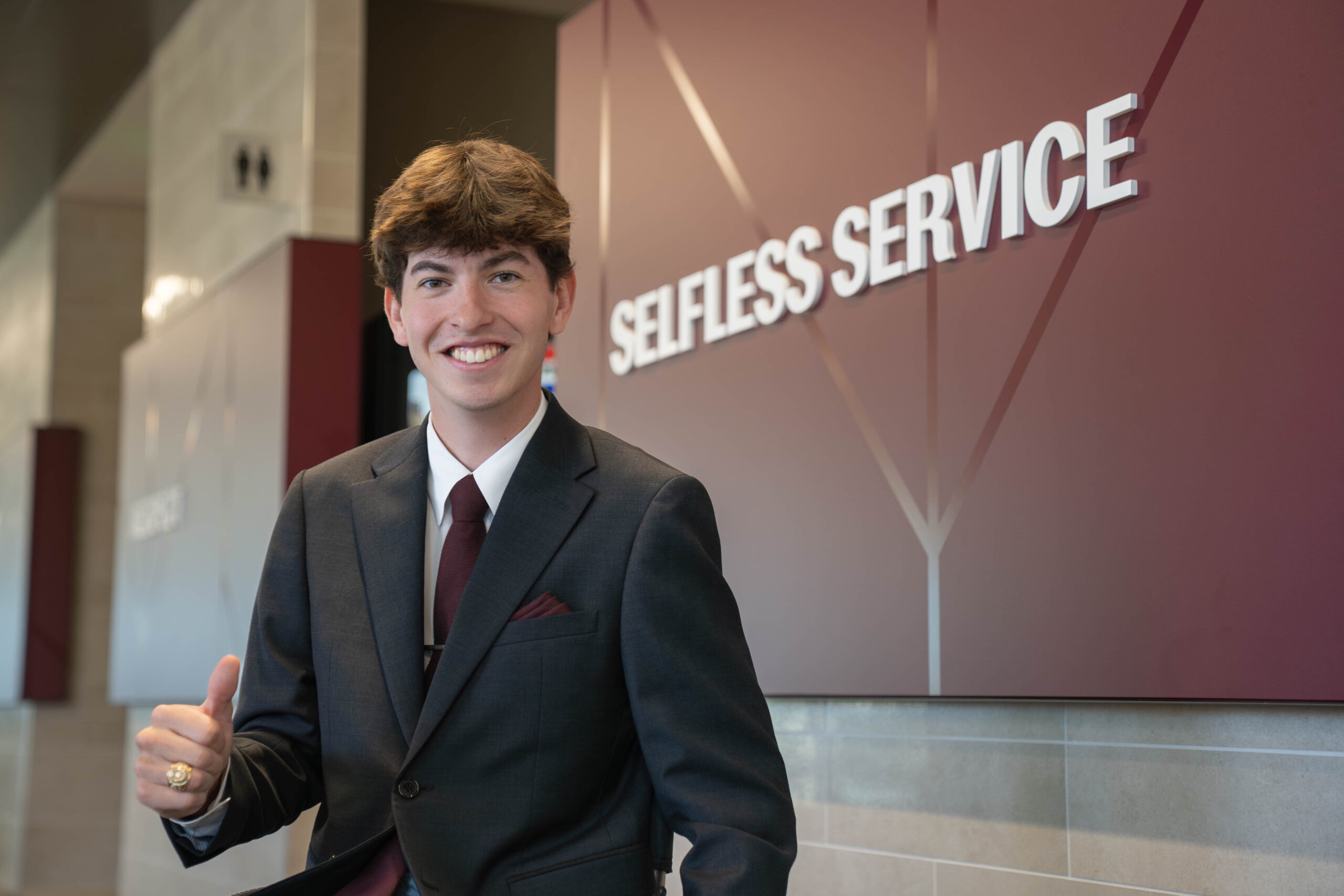Where Leadership Meets Legacy: Josh Sanders
Humans of Mays Business School – Senior Class President and Mays Business School Student Senator Josh Sanders ’26
October 28, 2025
|
Interview by Faith Emmitte | Photos by Chloe Kryzak
The Humans of Mays Business School series highlights excerpts from conversations with exceptional individuals at Mays who make a lasting impact through their leadership, drive, and dedication. Each story brings to life the diverse journeys, challenges, and triumphs that shape the Mays community. By sharing these unique experiences, we aim to inspire personal and professional growth within our halls and share the origin stories of today’s and tomorrow’s business leaders.
Josh Sanders is a senior finance major and currently serves as the senior class president and Mays Business School’s student senator. Over the summer, Josh interned with Southside Bank, applying his leadership skills to the business world. Josh is a true embodiment of the Aggie Spirit and the leadership skills we cultivate at Mays.
Made for More

“When I was born, I was pronounced dead for two minutes. I was rehabilitated, and from there, the doctors told my parents I’d probably live for three to six months. If I lived past that, I’d be completely immobile from the neck down and mentally incompetent. Over time, I got movement in my fingertips, then in my arms, and then in my legs. When I was about 1 year old I could fully function.”
“When my mom applied for me to attend preschool, they saw I was in a wheelchair. Even though I could fully move my body, they denied my application. We showed up at another one, and they told my mom that I’d probably need to have a nurse. But they gave us a two-day trial. After the first day, she called my mom in tears and said, ‘He’s more capable than any of the kids in this class.’ To sum all that up, you have to believe in yourself sometimes before others will. It’s something that has given me such a unique platform to go off of.”
“The neurologist couldn’t come up with a specific diagnosis, so I’m still, to this day, undiagnosed. Dr. Herring told my parents, ‘We don’t know what he has.’ That’s something rare to hear. Usually it’s, ‘Well, we can do this and we will know,’ but he was the only one to say, ‘We don’t know what he has, so let’s give it time to see if we can find a diagnosis.’ People ask me how I’m optimistic about certain things. A lot of times, I’ll give the story that I think I’m so blessed to have the mobility that I do have. It’s really easy to take things for granted, but I’m very grateful to have the mobility that I have. I can drive a car, I can wake surf, I do skiing, horseback riding, all that stuff. I think it’s very important not to take those things for granted.”
Where Passion Meets Purpose

“[The story of my interest in business] goes all the way back to Halloween when I was younger. After all the neighborhood kids had gotten done eating their candy, I saved all mine up and opened up a shop and sold it to all of them. My mom said, ‘’You’re going to go into banking or finance.’ Later, that transformed into starting my own business in my junior year of high school. We did address services, and essentially, we started doing door-to-door sales. That’s where I learned a lot of diligence. You’d knock on 20 doors and nobody would answer, and you’d knock on the next one and get a no. Finally, we knocked on that last one and got a yes.”
“It was later on that we started to leverage social media and joined different local groups, but the really pivotal moment there was when we decided to give a percentage from each curb back to philanthropy. I was president of AMBUCS at the time, which provides a bicycle for anybody, whether they have cognitive or functional disabilities, to utilize movement in their hands and feet, or provide ramps for low income families. When we put a percentage there, that took off completely. That was one of the coolest things to see: how philanthropy is directly tied to business and has a community impact. We ended up getting an interview on the news for local community impact and expanded from one county to four, and got donations all the way from Nebraska. That was my initial thought of, ‘I’m going to go into business.’”
“I interned at Southside Bank in their Investment Service Division and absolutely loved it. It was a smaller bank, so I feel like they gave me more freedom to explore what an actual advisor’s role looks like and the entirety of the bank. Being the Aggie that I was, I wanted to know the why — why they were financial advisors, and I got to see it in the client interactions throughout the time we were there. Seeing how they were able to plan for individuals and change their lives directly was pivotal for some individuals. Just having that sense of not just being an employee but being a part of someone’s life and being there through the ups and downs and helping them financially meet their goals in the end was what really drove me to pursue that career path.”
Rooted in Mays

“I think one of the best values you get when you come to A&M is the intentionality of the Aggie Ring. Aggies want to help other Aggies, and I’ve seen that day in and day out. There are mentorship opportunities that I’ve had of people that I just reach out to and they pour directly into you. I think one of the most important things about Mays is that they want to help you flourish past your degree. They want to set you up successfully with your values, and I think the values system is very important.”
“I’m currently in Titans of Investing led by Britt Harris, and that’s without a doubt one of the coolest programs I’ve been a part of. He teaches a lot of wisdom, investing, and gives you the accessibility to have executive mentors across industries. He really tries to emphasize the narrow path; there are so many different individuals and people who lead, but he wants to find individuals of high character to lead in those high roles and be the future of America and lead as a force for good.”
“Coming to Mays Business School has been a transformational experience for me. I’ve been able to gain exposure to mentors and leaders who have helped guide me and shared insights into their journey to get where they are. When you look at Mays Business School’s mission statement, it’s to develop leaders of character who make a positive difference in the communities where they live, work, and serve. When I look at that, what really stands out to me is the emphasis on character. I’m a strong believer that success is driven by a strong character that reflects a positive impact on those around you. You need to find what separates you from the crowd and what you can do better than anyone else, and I think Mays Business School has done a wonderful job at presenting that ideal to me, which sparked my desire to take on a lot of leadership roles.”
Leading with Heart

“When I initially looked into [being student senator of Mays Business School], I reached out to some people who were already in SGA and just talked to them to see how that has impacted them and how they’ve enjoyed it overall. I found out that it’s the only organization that represents the entire student body, which I found was really cool, and they had nothing but good things to say about it. I also wanted to get some exposure to the legislative side of things, so I found that this was a perfect opportunity to go out, campaign, and represent the business school. It’s really cool seeing the things it’s been able to impact, like the housing occupancy limits. That was a really big deal.”
“I also serve on the Committee of Finance, so we’re able to allocate funds from the budget to various committees that fall under the Student Government Association. We’re also able to work together for the betterment of the students and act in their interests. My role as senior class president, at its basics, is leading class meetings, doing socials, meeting with class councils, executives, board of directors, administrators, faculty, and making decisions on behalf of your entire class.”
“When I was serving as junior class vice president, we met with disability resources because we’d seen through student interactions that there had been a problem. We were having tests that were being administered during finals at the MSC because there wasn’t enough occupancy at the testing center, so we accumulated a lot of data with disability resources. With a personal connection at the Board of Regents, we really streamlined this issue and were able to accelerate funding for a $2.4 million testing facility. Working on that was really cool.”
Paving the Way

“I always have to sit back and take a minute to reflect: If being overwhelmed is my biggest problem, then this is a pretty good problem. This is such a first-world problem to sit back and think, ‘Oh my goodness, I’m so overwhelmed by meetings, jobs, etc,’ and take a step back to realize that if my biggest problem is being overwhelmed, then I’m doing pretty good.”
“I think one of the deepest roots of enjoyment stems from serving others. I read something from Harvard, and there are statistics that show that just two hours of volunteering and giving yourself back to others has helped people’s mental health and happiness. I think the only way you can sustain happiness over time is by giving yourself up and expecting nothing in return. George H.W. Bush said, ‘There’s no definition of a successful life without serving others.’ That’s one of the quotes I’ve tried to live by, for sure.”
“The best piece of advice that I’ve ever received is to be comfortable with uncomfortable. It’s so easy to just sit back and let the easy things override and not push yourself to the next thing. I’ve found that the majority of times that I underperform are when I get comfortable with myself. I think that piece of advice has really pushed me to keep going and tackle the next task that’s brought forth.”
“At the Association of Former Students, Professor Knoop spoke on how she didn’t know what her legacy was, but it ended up being teaching students. So I was sitting there and wondering, ‘What do I want my legacy to be?’ I want to leave a legacy behind that you shouldn’t be limited by anything — no matter what you’re born into or the challenges that may come into your life. There’s nothing you can’t overcome. I think God has given me such a unique platform to display how somebody with a disability is able to use that as an ability to possibly lead and inspire others to live a limitless legacy.”


